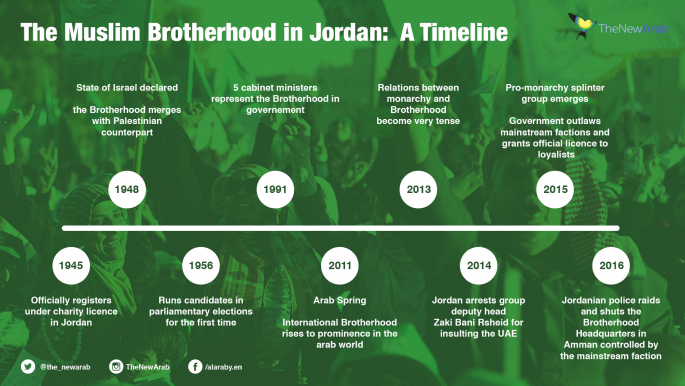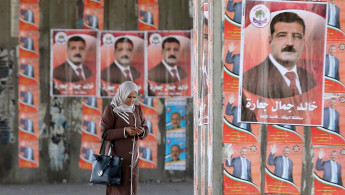The Muslim Brotherhood and Jordan's upcoming elections
The vote comes as Jordan - a key Western ally long lauded for its relative stability - finds itself under pressure from neighbouring conflicts and ruffled by domestic issues, including unemployment and growing radicalisation.
The September 20 elections will pose a key test of the state's ability to hold fair elections and of its willingness to accept a result that may boost the Islamists.
"All we want are credible elections that truly represent the will of the people, irrespective of how we will be represented in parliament," Zaki Bani Rsheid, the Brotherhood's second-in-command, told The New Arab.
"Jordan must make the most of this occasion... to rebuild citizen confidence in the electoral process and state institutions."
The Islamic Action Front [IAF], the political arm of Jordan's Muslim Brotherhood, once enjoyed considerable grassroots support - but the Brotherhood itself was weakened in the wake of the Arab Spring uprisings.
Authorities consider the group an illegal organisation because its licence was not renewed in line with a law on political parties adopted in 2014, forcing dozens of its offices into closure this year.
 |
|
| [Click to enlarge] |
| Read Also: The gradual weakening of the Muslim Brotherhood in Jordan |
The IAF boycotted elections in 2010 and 2013 in protest at the electoral system, which it said weakened parties in favour of tribal and other pro-government candidates.
Its decision to take part in next week's election after Jordan amended the electoral law in March is a way of regaining influence after years of ostracism.
"The party's decision to participate in the forthcoming elections follows the amendment in electoral law as well as a general consensus from Jordanian people who want to see our participation," Rsheid told The New Arab.
Although it has avoided the violent upheaval of some Arab states since 2011's wave of popular uprisings, Jordan has a growing list of issues that could spark insecurity.
A key member of a US-led coalition battling the Islamic State group in Syria and Iraq, Jordan is home to more than 600,000 Syrian refugees, according to the UN.
Unemployment is running at 14 percent and last month the International Monetary Fund approved a $723 million three-year line of credit to Jordan to support economic and financial reforms.
Amman instituted some reforms following Brotherhood-led protests in 2011, including amending its electoral law to allow political parties to submit lists and reserving 15 seats for women.
But the IAF wants further change, including a constitutional amendment to allow parliament to choose a government, rather than having the king name a prime minister, as is currently the case.
"The civil state which the IAF strives for is based on real democratic values and involves a transfer of power to the parliamentary majority, who in turn form the government," Rsheid told The New Arab.
The Brotherhood's grassroots popularity has not always translated to influence in a parliament that possesses only limited legislative clout, and for which the majority of candidates are likely to be loyal to the royal court.
Also, the group's ambiguous association with other country branches, including Egypt's Muslim Brotherhood - which has been outlawed as an "extremist group" in many Arab states - has led to suspicion among many.
"An analysis of campaign content revealed that the majority of campaigns are still dependent on empty slogans rather than well-defined political agendas," wrote Naseem Tarawnah editor of the progressive Jordanian blog, The Black Iris.
"Despite the declared participation of opposition groups like the Muslim Brotherhood, whose political implosion earlier this year produced several fractured parties, the elections face a tremendous credibility issue and a subsequent trust gap," Tarawnah said, in a comment piece for The New Arab.
"So despite all the rhetoric, the campaign slogans featuring change, or the post-election headlines that will surely come - these elections won't serve as a sign of a political reform progress - parliamentary performance will."
Agencies contributed to this report.







 Follow the Middle East's top stories in English at The New Arab on Google News
Follow the Middle East's top stories in English at The New Arab on Google News


